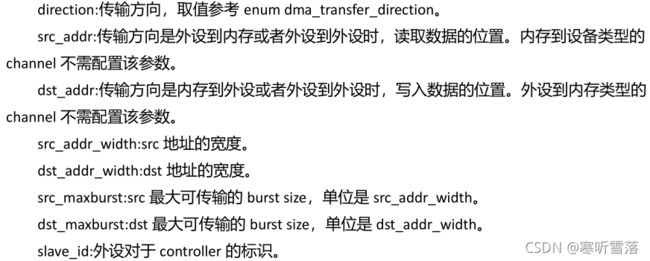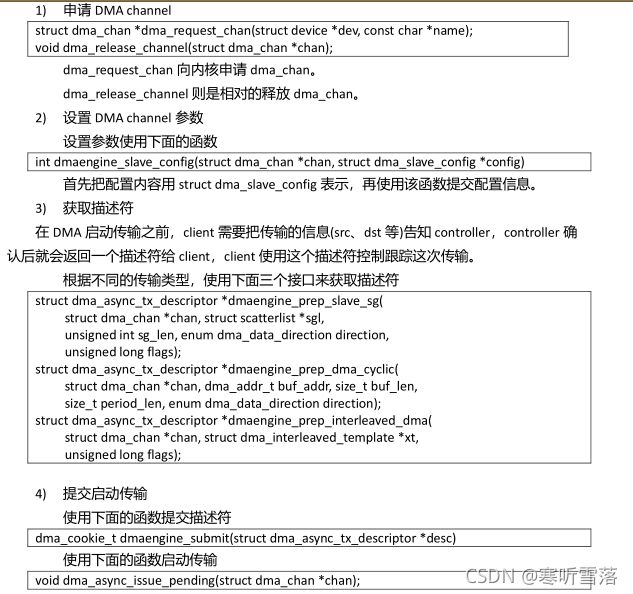linux DMA设备驱动详解
一,DMA相关定义(fpga、wait_queue 、device、interrupt、 dma_request_channel 函数、dma_start_transfer函数、poll、read,platform总线)
DMA (直接内存读写)是Direct Memory Access的缩写,也就是内存到内存,不占用CPU资源,但是会占用系统总线。DMA 支持内存到外设、外设到内存、内存到内存的数据交互,必要时节省很多CPU 资源。
1,transfer wide 可以理解为单次传输数据的大小,串口一次叧能传一个字节,而 DMA 则可以选择一次能传输的数据大小。在返基础上的 transfer size 则是传输的次数,不是单纯的总大小,也就是说 DMA 传输总长度实际上是transfer size乘上transfer wide。
2,burst size 是指DMAC内部缓存大小。当DMA 传输的源或目的是内存 memory 时,DMAC会先读取数据到缓存,再传入或传出。
3,scatter-gather:DMA操作必项是连续的物理内存,实际应用中,难免会遇到处理物理内存不连续的数据。scatter-gather指的就是把不连续的数据拷贝到连续的 buffer 中的操作。返个操作过程可以用软件实现,有直接的硬件支持。返里主要是强调 DMA 操作必项是连续的物理内存返件事。
二,linux 中的 DMA 框架
linux DMA engine 框架提供了 DMA controller和DMA client 两个框架。分别对应 DMA 提供者和 DMA使用者两个角度。pl330 是个 DMA 控制器,实际上就是站DMA提供者的角度。使用DMA的对象实际可以具体到内存到内存,内存就是DMA的使用者。DMA 控制器相关的操作都可以抽出来,他们对于其他使用者来说是想通的,这也是 linux 系统一贯的设计思路。DMA controller 框架抽象出 channel 对应 DMAC 的物理通道,又定义了虚拟的 channel,软件上可以实现多个虚拟 channel 对应一个物理通道。
1,struct dma_device 定义在include/linux/dmaengine.h 中
1. struct dma_device
2.{
3. unsigned int chancnt;
4. unsigned int privatecnt;
5. struct list_head channels;
6. struct list_head global_node;
7. struct dma_filter filter;
8. dma_cap_mask_t cap_mask;
9. unsigned short max_xor;
10. unsigned short max_pq;
11. enum dmaengine_alignment copy_align;
12. enum dmaengine_alignment xor_align;
13. enum dmaengine_alignment pq_align;
14. enum dmaengine_alignment fill_align;
15. #define DMA_HAS_PQ_CONTINUE (1 << 15)
16.
17. int dev_id;
18. struct device *dev;
19.
20. u32 src_addr_widths;
21. u32 dst_addr_widths;
22. u32 directions;
23. u32 max_burst;
24. bool descriptor_reuse;
25. enum dma_residue_granularity residue_granularity;
26.
27. int (*device_alloc_chan_resources)(struct dma_chan *chan);
28. void (*device_free_chan_resources)(struct dma_chan *chan);
29.
30. struct dma_async_tx_descriptor *(*device_prep_dma_memcpy)(
31. struct dma_chan *chan, dma_addr_t dst, dma_addr_t src,
32. size_t len, unsigned long flags);
33. struct dma_async_tx_descriptor *(*device_prep_dma_xor)(
34. struct dma_chan *chan, dma_addr_t dst, dma_addr_t *src,
35. unsigned int src_cnt, size_t len, unsigned long flags);
36. struct dma_async_tx_descriptor *(*device_prep_dma_xor_val)(
37. struct dma_chan *chan, dma_addr_t *src, unsigned int src_cnt,
38. size_t len, enum sum_check_flags *result, unsigned long flags);
39. struct dma_async_tx_descriptor *(*device_prep_dma_pq)(
40. struct dma_chan *chan, dma_addr_t *dst, dma_addr_t *src,
41. unsigned int src_cnt, const unsigned char *scf,
42. size_t len, unsigned long flags);
43. struct dma_async_tx_descriptor *(*device_prep_dma_pq_val)(
44. struct dma_chan *chan, dma_addr_t *pq, dma_addr_t *src,
45. unsigned int src_cnt, const unsigned char *scf, size_t len,
46. enum sum_check_flags *pqres, unsigned long flags);
47. struct dma_async_tx_descriptor *(*device_prep_dma_memset)(
48. struct dma_chan *chan, dma_addr_t dest, int value, size_t len,
49. unsigned long flags);
50. struct dma_async_tx_descriptor *(*device_prep_dma_memset_sg)(
51. struct dma_chan *chan, struct scatterlist *sg,
52. unsigned int nents, int value, unsigned long flags);
53. struct dma_async_tx_descriptor *(*device_prep_dma_interrupt)(
54. struct dma_chan *chan, unsigned long flags);
55. struct dma_async_tx_descriptor *(*device_prep_dma_sg)(
56. struct dma_chan *chan,
57. struct scatterlist *dst_sg, unsigned int dst_nents,
58. struct scatterlist *src_sg, unsigned int src_nents,
59. unsigned long flags);
60.
61. struct dma_async_tx_descriptor *(*device_prep_slave_sg)(
62. struct dma_chan *chan, struct scatterlist *sgl,
63. unsigned int sg_len, enum dma_transfer_direction direction,
64. unsigned long flags, void *context);
65. struct dma_async_tx_descriptor *(*device_prep_dma_cyclic)(
66. struct dma_chan *chan, dma_addr_t buf_addr, size_t buf_len,
67. size_t period_len, enum dma_transfer_direction direction,
68. unsigned long flags);
69. struct dma_async_tx_descriptor *(*device_prep_interleaved_dma)(
70. struct dma_chan *chan, struct dma_interleaved_template *xt,
71. unsigned long flags);
72. struct dma_async_tx_descriptor *(*device_prep_dma_imm_data)(
73. struct dma_chan *chan, dma_addr_t dst, u64 data,
74. unsigned long flags);
75.
76. int (*device_config)(struct dma_chan *chan,
77. struct dma_slave_config *config);
78. int (*device_pause)(struct dma_chan *chan);
79. int (*device_resume)(struct dma_chan *chan);
80. int (*device_terminate_all)(struct dma_chan *chan);
81. void (*device_synchronize)(struct dma_chan *chan);
82.
83. enum dma_status (*device_tx_status)(struct dma_chan *chan,
84. dma_cookie_t cookie,
85. struct dma_tx_state *txstate);
86. void (*device_issue_pending)(struct dma_chan *chan);
87. };2,struct virt_dma_cha 定义在文件 drivers/dma/virt-dma.h 中
struct virt_dma_desc
{
struct dma_async_tx_descriptor tx;
/* protected by vc.lock */
struct list_head node;
};
struct virt_dma_chan
{
struct dma_chan chan;
struct tasklet_struct task;
void (*desc_free)(struct virt_dma_desc *);
spinlock_t lock;
/* protected by vc.lock */
struct list_head desc_allocated;
struct list_head desc_submitted;
struct list_head desc_issued;
struct list_head desc_completed;
struct virt_dma_desc *cyclic;
};chan:一个 struct dma_chan类型的发量,用于和 client 交互。
task:一个 tasklet,等待该虚拟 channel 的传输完成。
desc_allocated、desc_submitted、desc_issued、desc_completed:四个链表头,用于保存不同状态的虚拟 channel 描述符。
三,DMA controller 框架相关 API
1,struct dma_device 注册和注销:
struct dma_device 初始化完成后,调用 dma_async_device_register 向内核注册。注册成功后 dma_device 会放在一个名称为 dma_device_list 的全局链表上,以便后面使用。
int dma_async_device_register(struct dma_device *device);
void dma_async_device_unregister(struct dma_device *device);//注销函数
2,DMA cookie 表示 DMA engine 在数据传送中使用的一段连续内存。
static inline void dma_cookie_init(struct dma_chan *chan)
static inline dma_cookie_t dma_cookie_assign(struct dma_async_tx_descriptor *tx)
static inline void dma_cookie_complete(struct dma_async_tx_descriptor *tx)
static inline enum dma_status dma_cookie_status(struct dma_chan *chan, dma_cookie_t cookie, struct dma_tx_state *state)
dma_cookie_init:初始化 channel 中的 cookie、completed_cookie。
dma_cookie_assign:为指针的传输描述分配一个 cookie。
dma_cookie_complete:一个传输完成时,可调用该接口更新该传输对应channel的completed_cookie字段。
dma_cookie_status:获叏挃定 channel 挃定 cookie 的传输状态。
四,DMA client 驱动框架
从源和目标的不同可以把 DMA 划分为四类:内存到内存、内存到外设、外设到内存、外设到外设。因为内存可以使用 memcpy、memset 等操作,linux engine中把内存到内存返一部分分离出来单独提供了一套API-Async TX API。剩余的三类就共用一个结构Slave-DMA API。Slave指代client :也就是DMA 使用者。应用层和驱动配合大致流程:FPGA-->产生一个DMA中断(pl中断),唤醒读数线程,告诉驱动有数据需要传输-->应用层调用驱动申请一个合适的DMA通道-->应用层调用read函数(在read函数中完成dev->dmamem的传输)读取DMA(dmamem)数据缓存的数据到用户空间。
1,内核中DMA client相关数据 结构
(1)struct dma_slave_config定义在 include/linux/dmaengine.h 中
struct dma_slave_config
{
enum dma_transfer_direction direction;
phys_addr_t src_addr;
phys_addr_t dst_addr;
enum dma_slave_buswidth src_addr_width;
enum dma_slave_buswidth dst_addr_width;
u32 src_maxburst;
u32 dst_maxburst;
bool device_fc;
unsigned int slave_id;
};(2)struct dma_async_tx_descriptor
struct dma_async_tx_descriptor
{
dma_cookie_t cookie;
enum dma_ctrl_flags flags; /*not a 'long' to pack with cookie*/
dma_addr_t phys;
struct dma_chan *chan;
dma_cookie_t (*tx_submit)(struct dma_async_tx_descriptor *tx);
int (*desc_free)(struct dma_async_tx_descriptor *tx);
dma_async_tx_callback callback;
void *callback_param;
struct dmaengine_unmap_data *unmap;
#ifdef CONFIG_ASYNC_TX_ENABLE_CHANNEL_SWITCH
struct dma_async_tx_descriptor *next;
struct dma_async_tx_descriptor *parent;
spinlock_t lock;
#endif
}; 2,Slave-DMA API 的 DMA client实现步骤
2,Slave-DMA API 的 DMA client实现步骤
5)等待传输结束
等徃传输可以通过回掉函数,也可以通过 dma_async_is_tx_complete 等函数数查询传输是否
完成。另外可以使用 maengine_pause、dmaengine_resume 函数,暂停、终止传输。
3,驱动代码
#include
#include
#include
#include
#include
#include
#include
#include
#include
#include
#include
#include
#include
#include
#include
#include
#include
#include
#define DEVICE_NAME "ax_dma"
#define MAX_SIZE (512*64)
static char *src;
static char *dst;
dma_addr_t dma_src;
dma_addr_t dma_dst;
struct ax_dma_drv
{
struct dma_chan *chan;
struct dma_device *dev;
struct dma_async_tx_descriptor *tx;
enum dma_ctrl_flags flags;
dma_cookie_t cookie;
};
struct ax_dma_drv ax_dma;
void dma_cb(void *dma_async_param)
{
if(!memcmp(src, dst, MAX_SIZE))
{
printk("dma irq test ok\r\n");
}
}
static int dma_open(struct inode *inode, struct file *file)
{
printk("dma_open\r\n");
return 0;
}
static int dma_release(struct inode *indoe, struct file *file)
{
printk("dma_release\r\n");
return 0;
}
static ssize_t dma_read(struct file *filp, char __user *buf, size_t size, loff_t *ppos)
{
int ret = 0;
printk("dma_read\r\n");
ax_dma.tx = ax_dma.dev->device_prep_dma_memcpy(ax_dma.chan, dma_dst, dma_src, MAX_SIZE, ax_dma.flags);
if (!ax_dma.tx)
{
printk(KERN_INFO "Failed to prepare DMA memcpy");
}
ax_dma.tx->callback = dma_cb;
ax_dma.tx->callback_param = NULL;
ax_dma.cookie = ax_dma.tx->tx_submit(ax_dma.tx);
if (dma_submit_error(ax_dma.cookie))
{
printk("DMA tx submit failed");
}
dma_async_issue_pending(ax_dma.chan);
return ret;
}
static struct file_operations ax_fops =
{
.owner = THIS_MODULE,
.open = dma_open,
.read = dma_read,
.release = dma_release,
};
static struct miscdevice dma_misc =
{
.minor = MISC_DYNAMIC_MINOR,
.name = DEVICE_NAME,
.fops = &ax_fops,
};
static int __init dma_init(void)
{
int ret=0;
dma_cap_mask_t mask;
ret = misc_register(&dma_misc);
if(ret)
{
printk("misc_register failed!\n");
return 0;
}
printk("drv register ok\n");
of_dma_configure(dma_misc.this_device, dma_misc.this_device->of_node, true);
dma_misc.this_device->coherent_dma_mask = 0xffffffff;
//源
src = dma_alloc_coherent(dma_misc.this_device, MAX_SIZE, &dma_src, GFP_KERNEL);
if (NULL == src)
{
printk("can't alloc buffer for src\n");
return -ENOMEM;
}
//目标
dst = dma_alloc_coherent(dma_misc.this_device, MAX_SIZE, &dma_dst, GFP_KERNEL);
if (NULL == dst)
{
dma_free_coherent(NULL, MAX_SIZE, src, dma_src);
printk("can't alloc buffer for dst\n");
return -ENOMEM;
}
printk("buffer alloc ok\n");
//初始化mask
dma_cap_zero(mask);
dma_cap_set(DMA_MEMCPY, mask);
ax_dma.chan = dma_request_channel(mask, NULL, NULL);
ax_dma.flags = DMA_CTRL_ACK | DMA_PREP_INTERRUPT;
ax_dma.dev = ax_dma.chan->device;
printk("chan request ok\n");
//给源地址一个初值
memset(src, 0x5A, MAX_SIZE);
//给目标地址一个不一样的初值
memset(dst, 0xA5, MAX_SIZE);
return 0;
}
static void __exit dma_exit( void )
{
dma_release_channel(ax_dma.chan);
dma_free_coherent(dma_misc.this_device, MAX_SIZE, src, dma_src);
dma_free_coherent(dma_misc.this_device, MAX_SIZE, dst, dma_dst);
misc_deregister(&dma_misc);
}
//驱动入口函数标记
module_init(dma_init);
//驱动出口函数标记
module_exit(dma_exit);
/* 驱动描述信息 */
MODULE_AUTHOR("subomb");
MODULE_ALIAS("dma");
MODULE_DESCRIPTION("DMA driver");
MODULE_VERSION("v3.0");
MODULE_LICENSE("GPL");
4,DMA测试代码
#include
#include
#include
#include
#include
#include
#include "unistd.h"
int main(int argc, char **argv)
{
int fd;
char *filename;
if(argc != 2)
{
printf("Error Usage\r\n");
return -1;
}
filename = argv[1];
fd = open(filename, O_RDWR);
if (fd < 0)
{
printf("can't open %s\n", filename);
return -1;
}
read(fd, NULL, 0);
close(fd);
return 0;
} 

